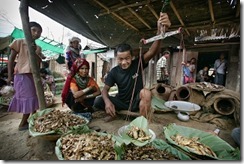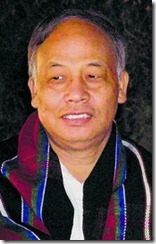By Patricia Mukhim

Women from the Northeast voice their grievances before Delhi chief minister Sheila Dikshit.
It is commonplace to hear of girls from the Northeast, living, working or studying in Delhi, being treated like easy game who can be raped and molested at will. It reflects the sick mentality and unresolved problems of masculinity of the average Indian male in the national capital. The racial profiling of girls from this region is bad enough. Now there is a tendency to exploit their vulnerabilities as well because most girls work late shifts and come home in the wee hours. They are probably being closely watched by those with a bad intent and pounced upon when they come home alone at night.
The media has played its role in highlighting the recent horrific incident that befell a 30-year-old girl a few days ago. She was returning from work at 1am when she was gangraped in a tempo that is meant to cart goods. It is not difficult, therefore, to imagine the profile of the rapists. They come from an economic class that has known and seen deprivation from close quarters and who try to hit back at the world by attacking those weaker than themselves because they are in no position to talk back to those who badger them. This is India’s reality and anyone who is in Delhi would know just how unequal the economic organisation is and how like a pyramid it looks, where the top represents the elite who can purchase everything they want, including sex, while the base comprises those millions who do not even have a roof over their heads and for whom sex is a sort of revenge against their fate.
Stark reality
It is also a stark reality that no mall or bistro or restaurant in Delhi, Gurgaon, Noida, Bangalore or Chennai is complete without a northeastern face. The other day, I went for a quick lunch at a bistro called Double Decker in South Extension, New Delhi. The girl behind the bar was from Manipur and so were the hostesses, including the one manning the very exclusive looking entry where one had to enter one’s name and telephone number. I picked up a conversation with the girls and asked them where they came from although I could guess that they were from the hills of Manipur. This is not to exacerbate the racial profiling because there are also other tribes from Manipur whose youth work as salesmen and salesgirls in some of the plush malls in Gurgaon. My point is that Manipur more than any other northeastern state has made it difficult for the young to continue to live there. They are forced to leave their homes in search of livelihood elsewhere.
You will invariably run into girls and boys from Manipur in branded cosmetic stalls like Clinique, Inglot and Shiseido. They explain things very meticulously to their clients. Perhaps they are employed because they possess these soft skills, apart from being adept at their own make-up and many of them certainly have flawless skin. Recently, I also met two Khasi saleswomen at a Titan watch showroom in South Extension. So our young people are venturing out and they have a right to look for opportunities outside. But that does not mean that they must fall prey to the male libido. They have every right to move around without fear. The Delhi government cannot shirk its responsibility by throwing the onus of security onto Northeast students and working population.
Many of the northeastern girls I have met in Delhi live around Moti Bagh with friends or siblings who also study and work. All of them slog to make a decent living. Women return home very late because they either work at call centres or in malls and bistros, all of which have long working hours. Their brothers suffer in silence knowing very well that their sisters are vulnerable. The whole notion that rape is a direct consequence of the way a woman dresses and behaves is a very male-centric polemic where women’s bodies are meant to be under the control and subjugation of men and where there is an unwritten code that women cannot behave the way they wish to without serious consequences.
Silent suffering
Last time when a similar incident happened in Delhi and a girl from the Northeast was murdered by her boyfriend for very obscure reasons, Delhi police came up with a list of dos and don’ts about how we should conduct ourselves. Surprisingly, there were no such directives for the rapists. Needless to say this is a slur on all of us. I would have thought that such a serious racial attack within our own country should have been taken up by the North East MPs Forum and that the matter should have come up for discussion in Parliament. But there was complete silence from their end. Who are our MPs representing anyway if they cannot assist their own people during such exigencies? I am also wondering why the Northeast students and working population based in Delhi have not written a petition to Congress president Sonia Gandhi for her intervention. Otherwise, Sheila Dikshit is unlikely to take things seriously. The last time some MPs from Manipur went to meet her on this issue she browbeat them instead, because they were too polite to talk back to her. Such is Delhi culture.
Indeed, every northeasterner who comes to Delhi is stunned by the crudity, the vulgarity and the baseness of the average male behaviour in this city. That there is a racial difference is evident not just in our looks but also in our demeanour.
This is not a case of “othering” but ours is a society that is not aggressive, loud or abrasive and it is certainly more respectful towards women. Even while disagreeing on issues, we do not shout down the opponent.
Above all, we live in an open society where it is not taboo for boys and girls to mingle. Though many of the tribes come from patriarchal backgrounds, there are palpable differences in the behaviour of men from this region and from the so-called Indian mainstream.
Women from the Northeast enjoy social mobility and know they are safe in their own surroundings. There are thousands of Naga girls studying in Shillong and Guwahati, away from their parents.
Yet they breathe easy, knowing that there are no potential rapists stalking them. Many of the girls I spoke to in Delhi told me that the city was unsafe after 10pm. They said they were never sure who was lurking behind the shadows since large parts of Delhi were dimly lit.
Scarred for life
There is this sad story of a girl working in a fast food joint of Delhi who silently suffered sexual advances from a colleague because she was afraid to complain.
Taking advantage of her vulnerability, the man one day abused her sexually. When she reported the incident to the higher-ups, she was asked to prove her innocence. Such incidents leave a deep scar on a woman, lead to depression and mar normal life.
While it is good that men and women from the Northeast are stepping out of their comfort zone and learning to swim in the rough waters of Delhi, there are no rules in this hurly-burly world called Delhi.
You cannot choose to plunge only in shallow waters but must swim to the deep end whether or not you are ready. Delhi is a fast growing city that does not even know which way it is growing.
And like every other big city here or in the West, women are vulnerable to all sorts of onslaughts. So the best way to be home and dry is to learn self-defence and stop feeling victimised.
Keeping that in mind, I would suggest that every northeastern girl enrol in a martial arts training institute and learn not just self-defence but also the art of making the attacker cringe in pain.
(The writer can be contacted at patricia17@rediffmail.com)
 New Delhi/Gangtok, Nov 30 : Scores of students and professionals from the northeast protested here on Monday against the rape of a BPO staffer from Mizoram and submitted a memorandum to PM Manmohan Singh.
New Delhi/Gangtok, Nov 30 : Scores of students and professionals from the northeast protested here on Monday against the rape of a BPO staffer from Mizoram and submitted a memorandum to PM Manmohan Singh.







 Mr Meghen was held in Bangladesh
Mr Meghen was held in Bangladesh



